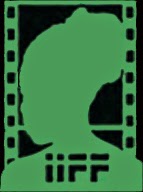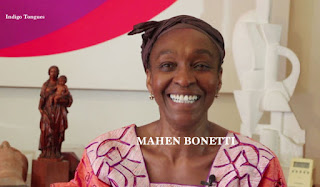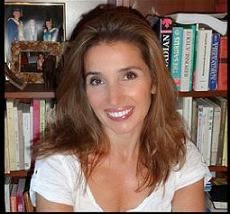 |
| Photo: Illusions (Julie Dash) - UCLA Film & Television Archives |
UCLA Film and Television Archive
23 March 2015 - 7:30 pm | 23 mars 2015 19h30
[English] - Français ci-après
In-person:
Omah Diegu, Jacqueline Frazier, Alile Sharon Larkin, M. Stormé Bright Sweet.
"L.A. Rebellion" has become the most common term used to describe a group of Los Angeles-based African and African American film artists recognized largely for their work produced between the 1960s and 1980s, when most of them met as students in UCLA’s School of Theater, Film and Television. Since our initial exhibition and tour, “L.A Rebellion: Creating a New Black Cinema,” the Archive has continued to preserve films and tapes by members of the group, many of which were only identified after 2011. The following program highlights the work of women filmmakers in the L.A. Rebellion and for the first time includes work produced on video. Except for Julie Dash’s Illusions (1982), which has been newly restored, all the present work is premiering for the first time since their original screenings in newly preserved copies. In their variety, all the films have in common not only an African American woman’s perspective, but also a focus on the process of coming to political and social consciousness. —Jan-Christopher Horak
M. Stormé Bright. The Single Parent: Images in Black (1982)
Jacqueline Frazier. Azz Izz Jazz (1978)
Stormé Bright, Alile Larkin. My Dream is to Marry an African Prince (1984)
Imelda Sheen. Forbidden Joy (1972)
Julie Dash. Illusions (1982)
[Français]
Réexaminer la L.A. Rebellion
En personne:
Omah Diegu, Jacqueline Frazier, Alile Sharon Larkin, M. Storme Bright Sweet.
La "L.A. Rébellion" est devenu le terme le plus couramment utilisé pour décrire un groupe de cinéastes afro-américain et africains basé à Los Angeles et reconnus largement pour leur travail réalisé entre les années 1960 et 1980, alors que la plupart d'entre eux sont réunis comme étudiants à l'école de cinéma, télévision et théâtre de l'UCLA (Université de Californie-Los Angeles). Depuis notre première exposition et tour, "L.A. Rébellion: Création d'un nouveau cinéma noir," l'Archive a continué de préserver les films et bandes des membres du groupe, dont beaucoup n’ont été identifiés qu’après 2011. Le programme suivant met en évidence les œuvres des femmes cinéastes dans la L.A. Rébellion et pour la première fois comprend celles qui ont été réalisées sur support vidéo. Sauf pour Illusions de Julie Dash (1982), qui a été récemment restauré, tous les ouvrages présents sont projetés en nouveaux exemplaires conservés pour la première fois depuis leurs projections originales. Dans leur diversité, tous les films ont non seulement en commun un point de vue de la femme afro-américaine, mais également un accent sur le processus de prise de conscience politique et sociale. –Jan-Christopher Horak
Restauré et financé par UCLA Film & Television Archive
The Single Parent : Images in Black | « Une famille monoparentale : images en noir » (1982)
The Single Parent : Images in Black (1982) de cinéaste M. Storme Bright: examine ce que c’est que d'être afro-américaine d’une famille monoparentale. Les parents discutent les défis d'être un parent seul, comment réagissent-ils face aux idées préconçues des autres et comment continuent-ils à vivre une vie « normale » malgré leurs nouvelles responsabilités. –Trisha Lendo
Productrice: M. Storme Bright. Directrice: M. Storme Bright. Cinématographie: Alile Larkin, Craig Roberts, Jay Abramowitz, M. Storme Bright. Distribution: Glenn, Utamu, Gwen, Henry, Ronnie. DigiBeta, couleur, 22 min.
La préservation numérique de 3/4 "bande U-matic par UCLA Film & Television Archive, Digital Lab.
Préservation financée par UCLA Film & Television Archive
Jazz Izz Azz (1978)
Azz Izz Jazz de Jacqueline Frazier présente la légende du jazz Billie Harris en studio au sax soprano avec un quatuor. Parmi ses chansons, « I Want Some Water » est une composition que Harris attribue en voix off à ses enfants (comme avec toutes ses chansons) qui étaient son inspiration. En 1970, Harris, décédé l'an dernier [2014], a fondé l'Azz Izz le club de jazz de Venise en Californie, qui a accueilli des célèbres comme Art Blakey, Horace Tapscott, Bobby Hutcherson et Billy Higgins. –Trisha Lendo
Réalisatrice: Jacqueline Frazier. Distribution: Billie Harris.
DigiBeta, couleur, 18 min.
La préservation numérique de 3/4 "bande U-matic par UCLA Film & Television Archive, Digital Lab.
Préservation financée par UCLA Film & Television Archive
My Dream is to marry an African Prince, « Mon rêve est d'épouser un prince africain » (1984)
My Dream is to marry an African Prince s’ouvre avec un groupe de jeunes étudiants expliquant leur idée de la royauté basée sur ce qu'ils ont lu dans les livres et vu à la télévision et dans les films. Ensuite les villageois d’Afrique rendent visite aux jeunes pour leur donner une leçon d'histoire sur les traditions et les coutumes de l'Afrique, ce qui est une perspective de la royauté très différentes de celle qu’ils ont envisagée. –Trisha Lendo
Producteur: The Black Filmmakers Collective (Le Collectif des cinéastes noirs). Réalisatrices: Stormé Bright, Alile Larkin. Scénariste: Les cinéastes noirs collective. Directeur de la photographie: Bert Yoshishigi. Montage: Dawnkwa Khan, Alile Larkin, Ben Caldwell. Distribution: Melvonna Ballenger, Alile Larkin, Faola Ifagboyede, Adeyemi Oyelumi, Ayaba Iya Agotine. DigiBeta, couleur, 23 min.
La préservation numérique de 3/4 "bande U-matic par UCLA Film & Television Archive, Digital Lab.
Restauré et financé par UCLA Film & Television Archive
Forbidden Joy « La joie interdite » (1972)
Dans Forbidden Joy (1972), la directrice Imelda Sheen utilise de nombreuses techniques d'avant-garde pour raconter l'histoire mystérieuse d'une femme avec un bébé en traine de pique-niquer dans un cimetière. La musique du film change selon l’humeur: de musique d’Afrique, au funk, à la soul, à la musique classique, tandis que les images en noir et blanc nous montrent un aperçu des rues dures dans le passé de la femme. –Trisha Lendo
Réalisatrice: Imelda Sheen. DigiBeta, couleur, 11 min.
Transfert numérique de la projection 16mm par UCLA Film & Television Archive, Digital Lab.
Préservation financée par UCLA Film & Television Archive
African Woman USA « Femme Africaine USA » (1980)
African Woman USA raconte l'histoire d'une africaine qui étudie la danse aux Etats-Unis. Elle travaille pour élever ses enfants, une fille qui habite avec elle et les deux autres en Afrique. Contente d’avoir acquis un permis de travail, elle est quand même confrontée au sexisme et au racisme lors de la recherche d'un emploi. Ses ennuis continuent quand elle est trahie par un homme qui se présente comme producteur. Le film utilise le jazz et la musique traditionnelle d’Afrique pour accentuer les thèmes de l'amitié et du danger qui façonnent l'expérience d'une immigrée africaine aux États-Unis. –Trisha Lendo
Réalisatrice :
Omah Diegu (Ijeoma Iloputaife). Scénariste: Omah Diegu (Ijeoma Iloputaife). Directeur de la photographie: Ben Caldwell. Musique: Eugene Bohlmann. DigitBeta, couleur, 20 min.
La préservation numérique de 3/4 "bande U-matic par UCLA Film & Television Archive, Digital Lab.
Préservation financée par le National Film Preservation Foundation et Women Make Movies
Illusions (1982)
Illusions de Julie Dash a été réalisé avec une subvention de Woman Make Movies alors qu'elle était étudiante à l'UCLA. Dans l'après-Seconde Guerre mondiale à Hollywood, l’afro-américaine Mignon Dupree se fait passer pour une blanche afin de pouvoir travailler comme assistante de direction. Dans ce poste elle se bat pour avoir des histoires des vrais gens. Pendant ce temps dans le même studio, la chanteuse afro-américaine Ester Jeeter est engagée pour doubler la voix d'une actrice blanche. La fascination de Duprée avec la puissance de Hollywood pour réécrire l'histoire, se faite l’écho de la critique pénétrante de Dash de ce même pouvoir qui cherche à occulter la diversité. –Trisha Lendo
Productrice: Julie Dash. Réalisatrice: Julie Dash. Scénariste: Julie Dash. Directeur de la photographie: Ahmed E. Maanouni. Musique: Eugene Bohlmann. Montage: Julie Dash, Charles Burnett. Distribution: Lonette McKee, Rosanne Katon, Ned Bellamy, Jack Radar, Fernando Lundi Faust. DCP, noir / blanc, 36 min.
La préservation des 16mm d'origine et de la bande sonore magnétique 35mm d'origine. Les services de laboratoire par Fotokem, Audio Mechanics et Endpoint Audio Labs. Des remerciements particuliers aux Julie Dash, Maurice Schechter.




















